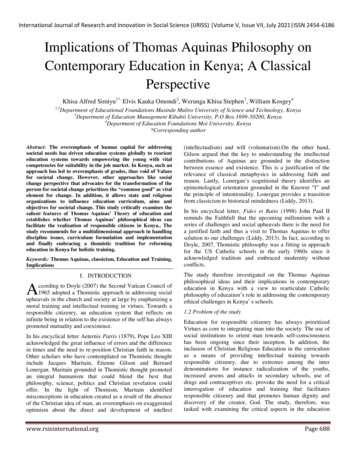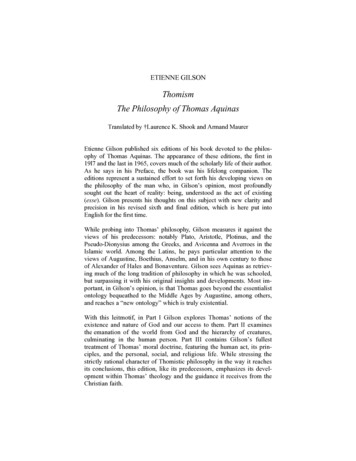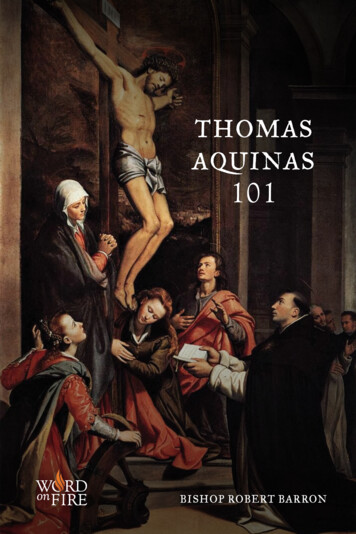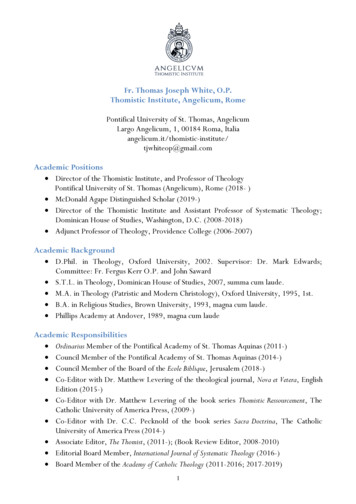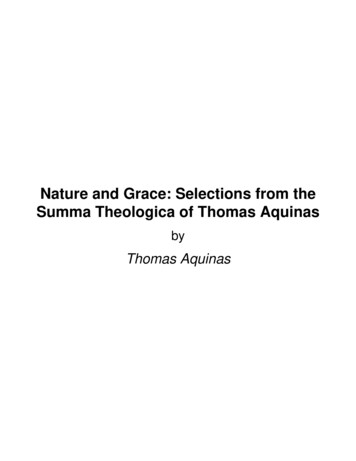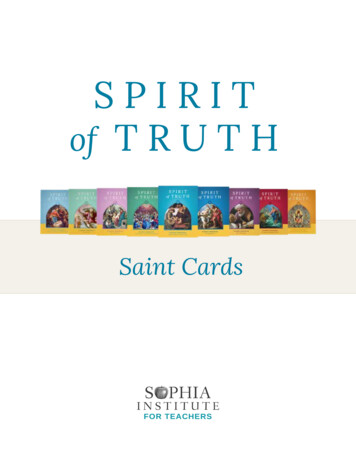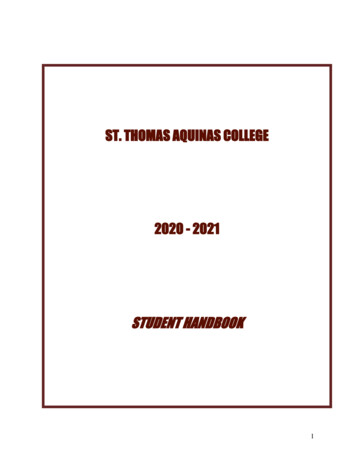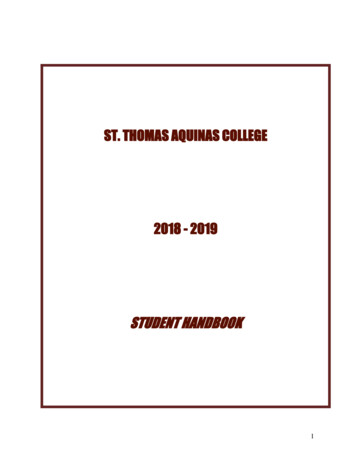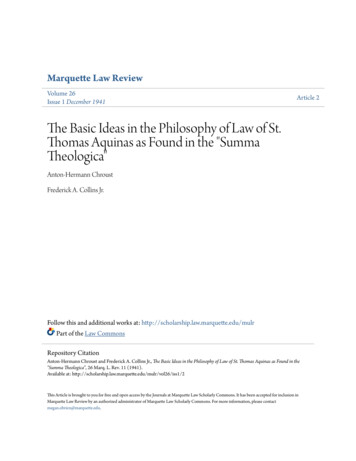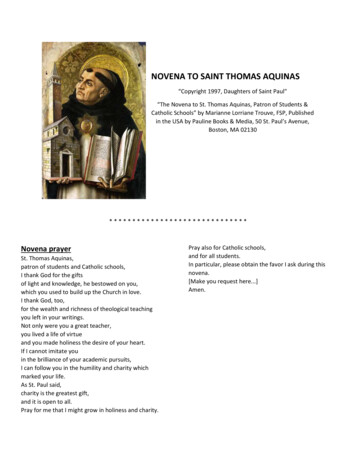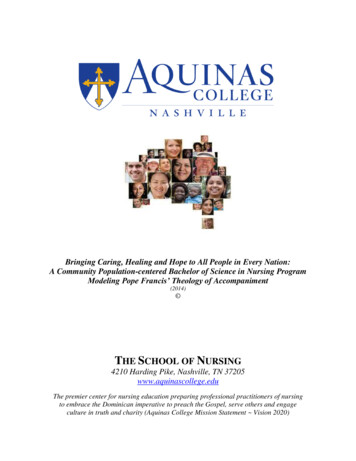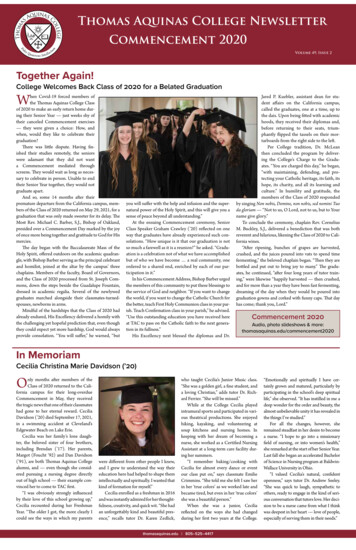
Transcription
sQThomas Aquinas College NewsletterCommencement 2020mThomaFidelegeolsuinasAqCu a e re n s In t el l ectuVolume 49, Issue 2Together Again!College Welcomes Back Class of 2020 for a Belated GraduationWhen Covid-19 forced members ofthe Thomas Aquinas College Classof 2020 to make an early return home during their Senior Year — just weeks shy oftheir canceled Commencement exercises— they were given a choice: How, andwhen, would they like to celebrate theirgraduation?There was little dispute. Having finished their studies remotely, the seniorswere adamant that they did not wanta Commencement mediated throughscreens. They would wait as long as necessary to celebrate in person. Unable to endtheir Senior Year together, they would notgraduate apart.And so, some 14 months after theirpremature departure from the California campus, members of the Class of 2020 returned on May 29, 2021, for agraduation that was only made sweeter for its delay. TheMost Rev. Michael C. Barber, S.J., Bishop of Oakland,presided over a Commencement Day marked by the joyof once more being together and gratitude to God for Hismercies.The day began with the Baccalaureate Mass of theHoly Spirit, offered outdoors on the academic quadrangle, with Bishop Barber serving as the principal celebrantand homilist, joined at the altar by the campus’ threechaplains. Members of the faculty, Board of Governors,and the Class of 2020 processed from St. Joseph Commons, down the steps beside the Guadalupe Fountain,dressed in academic regalia. Several of the newlywedgraduates marched alongside their classmates-turnedspouses, newborns in arms.Mindful of the hardships that the Class of 2020 hadalready endured, His Excellency delivered a homily withthe challenging yet hopeful prediction that, even thoughthey could expect yet more hardship, God would alwaysprovide consolation. “You will suffer,” he warned, “butyou will suffer with the help and infusion and the supernatural power of the Holy Spirit, and this will give you asense of peace beyond all understanding.”At the ensuing Commencement ceremony, SeniorClass Speaker Graham Crawley (’20) reflected on oneway that graduates have already experienced such consolations. “How unique is it that our graduation is notso much a farewell as it is a reunion?” he asked. “Graduation is a celebration not of what we have accomplishedbut of who we have become a real community, oneordered to a shared end, enriched by each of our participation in it.”In his Commencement Address, Bishop Barber urgedthe members of this community to put these blessings tothe service of God and neighbor. “If you want to changethe world, if you want to change the Catholic Church forthe better, teach First Holy Communion class in your parish. Teach Confirmation class in your parish,” he advised.“Use this outstanding education you have received hereat TAC to pass on the Catholic faith to the next generation in its fullness.”His Excellency next blessed the diplomas and Dr.Jared P. Kuebler, assistant dean for student affairs on the California campus,called the graduates, one at a time, up tothe dais. Upon being fitted with academichoods, they received their diplomas and,before returning to their seats, triumphantly flipped the tassels on their mortarboards from the right side to the left.Per College tradition, Dr. McLeanthen concluded the program by delivering the College’s Charge to the Graduates. “You are charged this day,” he began,“with maintaining, defending, and protecting your Catholic heritage, its faith, itshope, its charity, and all its learning andculture.” In humility and gratitude, themembers of the Class of 2020 respondedby singing Non nobis, Domine, non nobis, sed nomini Tuoda gloriam — “Not to us, O Lord, not to us, but to Yourname give glory.”To conclude the ceremony, chaplain Rev. CorneliusM. Buckley, S.J., delivered a benediction that was bothreverent and hilarious, likening the Class of 2020 to California wines.“After ripening, bunches of grapes are harvested,crushed, and the juices poured into vats to spend timefermenting,” the beloved chaplain began. “Then they arebottled and put out to bring joy to many.” The graduates, he continued, “after four long years of tutor training,” were likewise “happily harvested — then crushed,and for more than a year they have been fast fermenting,dreaming of the day when they would be poured intograduation gowns and corked with funny caps. That dayhas come; thank you, Lord.”Commencement 2020Audio, photo slideshows & more:thomasaquinas.edu/commencement2020In MemoriamCecilia Christina Marie Davidson (’20)Only months after members of theClass of 2020 returned to the California campus for their long-overdueCommencement in May, they receivedthe tragic news that one of their classmateshad gone to her eternal reward. CeciliaDavidson (’20) died September 17, 2021,in a swimming accident at Cleveland’sEdgewater Beach on Lake Erie.Cecilia was her family’s lone daughter, the beloved sister of four brothers,including Brendan (’17). Her parents,Margot (Foucht ’92) and Dan Davidson(’91), are both Thomas Aquinas Collegealumni, and — even though she considered pursuing a nursing degree directlyout of high school — their example convinced her to come to TAC first.“I was obviously strongly influencedby their love of this school growing up,”Cecilia recounted during her FreshmanYear. “The older I got, the more clearly Icould see the ways in which my parentswere different from other people I knew,and I grew to understand the way theireducation here had helped to shape themintellectually and spiritually. I wanted thatkind of formation for myself.”Cecilia enrolled as a freshman in 2016and was instantly admired for her thoughtfulness, creativity, and quick wit. “She hadan unforgettably kind and beautiful presence,” recalls tutor Dr. Karen Zedlick,who taught Cecilia’s Junior Music class.“She was a golden girl, a fine student, anda loving Christian,” adds tutor Dr. Richard Ferrier. “She will be missed.”While at the College Cecilia playedintramural sports and participated in various theatrical productions. She enjoyedhiking, kayaking, and volunteering atsoup kitchens and nursing homes. Inkeeping with her dream of becoming anurse, she worked as a Certified NursingAssistant at a long-term care facility during her summers.“I remember baking/cooking withCecilia for almost every dance or eventour class put on,” says classmate EmilieCrimmins. “She told me she felt I saw herin her ‘true colors’ as we worked late andbecame tired, but even in her ‘true colors’she was a beautiful person.”When she was a junior, Ceciliareflected on the ways she had changedduring her first two years at the College.thomasaquinas.edu 805–525–4417“Emotionally and spiritually I have certainly grown and matured, particularly byparticipating in the school’s deep spirituallife,” she observed. “It has instilled in me adeep wonder for the order and beauty, thealmost unbelievable unity it has revealed inthe things I’ve studied.”For all the changes, however, sheremained steadfast in her desire to becomea nurse. “I hope to go into a missionaryfield of nursing, or into women’s health,”she remarked at the start of her Senior Year.Last fall she began an accelerated Bachelorof Science in Nursing program at BaldwinWallace University in Ohio.“I valued Cecilia’s natural, confidentopenness,” says tutor Dr. Andrew Seeley.“She was quick to laugh, sympathetic toothers, ready to engage in the kind of serious conversation that tutors love. Her decision to be a nurse came from what I thinkwas deepest in her heart — love of people,especially of serving them in their needs.”
“We Thank You for What You Have Given to TAC”Dr. McLean’s Remarks to the Class of 2020 at the President’s DinnerCongratulations and welcome back to the Class of2020. The last time we spoke I wasannouncing the end of in-personinstruction, the pivot to onlinelearning, and the cancelation ofyour graduation ceremony and allthe attendant celebrations.It’s wonderful that so many ofyou have returned to reunite withyour classmates and tutors to joyfully mark the Commencementyou so richly deserve. We havevery much looked forward to thisreunion and we are grateful for theopportunity we have had to partner with you — albeit with a significant interruption — in your education.It’s an understatement to say that your class certainlyhad its share of challenges.First, a sudden and lengthy evacuation in the face ofthe Thomas Fire on December 4, 2017 — an evacuationwhich extended to the beginning of the spring semester in January 2018. Some of our students left withoutpurses or wallets and had to charm their way throughTSA at local airports; others, for all I know, left withoutsufficient socks and underwear. All this in their haste toobey fire officials’ and the College administration’s command to leave.After the fire we were worried about possible floodsand earthquakes, but managed to avoid those at least onour campus here.As you well know, we didn’t skip a pandemic, whichcaused yet another evacuation. Thanks in large part to yourand to the faculty’s patience, cooperation, and flexibility,Zoom instruction went pretty well. But it was no substitute for the community life that is so essential to our ability to foster the moral, intellectual, and theological virtuesand to our ability to conduct successfully our program ofCatholic liberal education.Together with the faculty and staff,our remaining students, as you know,managed to return this year to in-person instruction and community life —with all its plans, protocols, and procedures — pretty darn well.They succeeded in completing theacademic year here and enjoyed theextracurricular activities that make fora rewarding and fulfilling respite fromthe rigors of academic work. Theywere also nourished with the gracesprovided by our chaplains — perhapseven more graces than are customaryif hand sanitizer is in any way capableof providing supernatural benefits.I think we should be grateful to God, to our benefactors, and to Dean Goyette for our having completed theyear as well as we have.Your class, although you never returned to in-personinstruction, has much to celebrate this evening. The factthat so many of you have returned for your Commencement ceremony is a cause for celebration in its own right.You were diligent students andfaithful members of the community. While here, you worked hardat your studies, fostered healthyfriendships, contributed to thecommon good, and tended to yourspiritual well-being. We thank andcommend you for these things andwe thank you for what you havegiven to Thomas Aquinas College— to the success of our classes, toour musical, dramatic, and athleticculture, and to our worship.You were tutored by a wonderful faculty and taught by the likes of“As a result of true friendships withyour tutors and fellow students and theministry of our chaplains, you grew invirtue and, I hope, ended a few stepscloser to the Beatific Vision.”Homer, Euclid, Plato, Aristotle, St. Augustine, St. ThomasAquinas, Shakespeare, Newton, Newman, and Einstein.You read some of the greatest books our civilizationhas produced and pondered some of the deepest questions humanity faces. You began in wonder and, I hope,ended with the beginnings of wisdom. As a result of truefriendships with your tutors and fellow students and theministry of our chaplains, you grew in virtue and, I hope,ended a few steps closer to the Beatific Vision.You should be proud of what you achieved and grateful for what you received. Please pray for those benefactors who make the College possible, pray for the facultywho made your education possible, and pray for yourclass, that all its members may continue to grow in ageand wisdom and grace.Thank you.One Year Later“I Took a Gamble, and I Won Big”Kayla (Grimm ’20) MurphyPart of the Thomas Aquinas College application is anessay on why you want to go to TAC. The irony ofthis essay is that you can’t possibly know why you wantto go until you’ve gone — or rather, you can’t really knowwhy the education is worthwhile until you have in somepart received it.I went to TAC on a gamble. I didn’t know what exactlythe school had to offer. I might have copied phrases like“education for its own sake” from the College website,but what high school student can grasp that concept?“The Class of 2020 caught up on thelast year of our lives spent apart andthen left rejuvenated — ready to returnto our homes across the U.S. and theworld, and to continue to fight the goodfight wherever we go, with the love of theFaith and of the Truth and of each otherburning brightly within us.”What I knew was that I wanted to be like the graduates of Thomas Aquinas College. The ones I knew, myparents especially, were happy and good people. Notto mention, they were fun-loving, joy-filled, intelligent,well-read, still great friends with their classmates from20 years ago, and with only good things to say abouttheir alma mater.I didn’t know what about TAC made these graduatesthis way, but I thought maybe if I went I could get a pieceof this happiness for myself. I knew I may be sacrificingthe career paths at Notre Dame or UCLA that many ofmy high school classmates were choosing, but it seemedworth the risk.So I took a gamble, and I won big. The education Ireceived at TAC was not only worthwhile, but priceless.I won’t attempt to describe that education or itscountless benefits — I have neither the skill nor the pagespace.But I can tell you that there is no experience in theworld like the joy of understanding, entirely for its ownsake, a piece of Newton’s Principia or St. Thomas’ SummaTheologiae.And I can tell you I was happy while I was at TAC,I am proud to have graduated, and I feel confident thatwith the tools I received there I can tackle any schooling,career, or vocation that God has planned for me.My classmates and I — the Class of 2020 — are particularly grateful for our time at Thomas Aquinas College. We had the unique experience of being sent homefor the last month of our time at TAC. We saw the valueof our community never more clearly than when chancedeprived us of it prematurely. We saw the value of theeducation with new light when we realized the tutorsand the whole staff were willing to jump through hoopsin order to help us achieve it, and to help us celebratethat achievement, even a whole year later.During that year I joined the workforce, married my2husband and classmate Michael, andhad a baby boy,baptized DamienPeter on May 8,2021. My husbandand I excitedlylookedforwardto our graduationin May. We wereeager to laugh andto commemorateand to philosophizewith our tutors andclassmates, to introduce our son to them, and to celebrate with them ourachievement of four years.The Class of 2020 caught up on the last year of ourlives spent apart and then left rejuvenated — ready toreturn to our homes across the U.S. and the world, andto continue to fight the good fight wherever we go, withthe love of the Faith and of the Truth and of each otherburning brightly within us.I will carry the memory of TAC through life, andin turn, the memory of my time there, along with theeducation I received and the friends I made, will carryme through life — and God willing, happily into thenext.Mrs. Murphy is from Pasadena, California.
“Hold Fast to Faith”Bishop Barber’s Homily from the Baccalaureate MassThe Most Rev. Michael C. Barber, S.J, Bishop of Oakland,served as Thomas Aquinas College’s 2020 CommencementSpeaker on May 29, 2021.“Remember the word I spoke to you: No slave isgreater than his master. If they persecuted Me,they will also persecute you. If they kept My word, theywill also keep yours. And they will do all these things toyou on account of My name, because they do not knowthe one who sent Me” ( Jn. 15:20-1).Every seven years, the bishop of a diocese is requiredto go to Rome for his ad limina visit, to visit the Popeand the cardinals who are different heads of the Vaticandepartments or dicasteries. During the last years of thereign of Pope John Paul II, when Cardinal Ratzinger wasstill the head of the Congregation for the Doctrine of theFaith, a group of bishops from the West Coast went overto Rome. I was not among them, but one of the bishopstold me this story:They went in to have their audience with CardinalRatzinger, and they went into the Congregation of theDoctrine of the Faith. They were shown into this verylarge room, and up in front of the room was a giant benchthat looked just like the bench of the Supreme Court, andCardinal Ratzinger was seated there, with his assistantofficials and archbishops of the Congregation. (When Iwent for my ad limina last year, I was in that room, andI immediately knew where we were; I said, “How manyJesuits have had their heresy trials in this room?”) Continuing the story: Cardinal Ratzinger, as head of the Congregation, made a few introductory remarks, and then hesaid, “Are there any questions from you visiting bishops?”One bishop raised his hand — he was a new bishop— and he says, “Your Eminence, what do we do? Weare attacked for being pro-marriage; we are attacked forbeing pro-life; we are attacked by pro-choice people;we are attacked by people in pro-euthanasia, gay marriage, transgender movements; and they are all violentlyagainst us. What do we do, Your Eminence?”And Cardinal Ratzinger pressed his microphone onand said, “Yes, you will suffer.” Click. That’s it.“Yes, you will suffer.”Peace Beyond All UnderstandingLike the loyal Catholics living in Mexico in the 1920s,or during the time of Nazi Germany, or if you are a Catholic living in China and faithful to the Pope, or in Vietnam, or Japan, or Africa, during the times of persecutionsby emperors and kings, or if you were a Catholic in England in the time of Henry VIII or Queen Elizabeth, or ifyou were a Catholic at the time of Jesus and his Apostles,you will suffer. But you will suffer with the help and infusion and the supernatural power of the Holy Spirit, andthis will give you a sense of peace beyond all understanding. When you are under attack, remember the wordsof Jesus, Who prepared His apostles for their oncomingpersecution: “Take courage. I have overcome the world.”We have to remember that.“When you are under attack, rememberthe words of Jesus, Who prepared Hisapostles for their oncoming persecution:‘Take courage. I have overcome theworld.’ We have to remember that.”For example, Fr. Christopher Magallanes in 1920sMexico, not even 100 years ago: At that time the government of Mexico was hostile to the Church and madeit a crime to say Mass, attend Mass, or receive baptism.The Mexican government closed all seminaries, and yetFr. Christopher Magallanes opened a clandestine seminary in his parish. Like Fr. Miguel Pro, Fr. Christopherwent around celebrating underground Masses. Eventually arrested and falsely accused of inciting rebellion, hegave away his possessions to his executioners, then gavethem absolution. Then, his last words before he was shot:“I am innocent, and I die innocent. I forgive with all myheart those responsible for my death, and I ask God thatthe shedding of my blood serve the peace of our dividedMexico.” That priest died radiating peace, peace hereceived through the indwelling of the Holy Spirit.In Vietnam, in the times of the persecutions there,Fr. Andrew Dũng-Lạc, one of the first native Vietnamese priests: He was arrested multiple times and held forransom. The faithful raised the ransom money; he gotreleased; he would go to another village, another town,get arrested again, get ransomed again; and finally theyjust couldn’t raise any more money to ransom him,and he was executed by beheading. Yet his example hasinspired generations of Vietnamese Catholics.I went to Vietnam a couple of years ago at the invitationof one of the bishops. He asked me to give a talk to all thepriests in his diocese whom he had brought together, andhe translated for me. He said, “Bishop Barber, notice, whenyou look at this group of priests: There are a lot of youngones, no middle-aged priests, and then about a dozenelderly.” He went on, “We have no middle-aged becausethe Church was shut down by the Communists in thatperiod, and every elderly priest you see here spent at least10 years in prison.” Those elderly priests radiated peace.If you stand for the Faith, yes, you will suffer. Butremember what Cardinal Newman said: “Those whotake part with Peter are on the winning side.” Hear Christsay to you, “You will be my witnesses to the ends of theEarth.” Well, how do we handle that? What do we do?How am I going to do that?Hold Fast to FaithFollow what St. Paul says in the letter to the Colossians: “You must hold fast to faith. Be firmly groundedand steadfast in it; unshaken in the hope promised youby the Gospel you have received.”I just want to say that again: “You must hold fast tofaith. Be firmly grounded and steadfast in it, unshakenin the hope promised to you by the Gospel you havereceived.” And if you do that, then the peace of God,which surpasses all understanding, will guard your heartsand minds in Christ Jesus.And one last thing: It’s not all bad news. It’s not allpersecution. If it were all suffering, no one would joinour religion, right? But the Lord sends us the encouragement and the consolation we need. He shows us Hislove; His sacred heart is always there. One of the greatestencouragements I have received personally in the last fewyears is this: I have seen people who are willing to giveup everything to become Catholic and enter the Church.One example: my close friend of over 25 years; hisname is Travis Moger. He and I were fellow Navy chaplains and officers. We both rose up the ranks togetherover a 20-year period. We both became captains in the3Navy. Travis was a Southern Baptist minister, and of the900 chaplains in the Navy, 300 are Southern Baptist. Hewas in line to become the next Admiral Chief of Chaplains for the Navy Reserve. He had a doctorate in history and was a professor at the U.S. Naval Academy. Hadeverything going for him.“If you stand for the Faith, yes, you willsuffer. But remember what CardinalNewman said: ‘Those who take part withPeter are on the winning side.’”Three years ago, he called me up, and said, “Mike, Ihave a surprise for you. My wife, my children, and I aregoing to be received into the Catholic Church at the Easter Vigil.” I almost dropped the phone. I was stunned. Hehad to give up becoming an admiral; not only that, theSouthern Baptists would rescind their endorsement ofhim as a chaplain, and he would have to resign his commission as a naval officer. He couldn’t become a Catholicchaplain, because you have to be a priest, and you can’tgo from being a Baptist minister directly to being a Catholic priest; you’ve got to be a normal Catholic first, thengo to seminary. So he had to abandon his Naval career, allfor our faith.And yet he was at total peace. I said to him, “How areyou going to live? What are you going to do? How areyou going to feed your family? You have three children!”He said, “I don’t know, but I know God will take care ofme.” He had that peace beyond all understanding.He wrote a fantastic one-page testimony, like Newman’s Apologia, only in one page — Why I Decided toBecome a Catholic — and he gave it to all 300 SouthernBaptist chaplains in the Navy. Just to quote a bit of whathe said: “At the age of 50, I am leaving the ministry I loveto follow Christ, Whom I love more.” He said, “An intensive study of the Bible and Christian history convincedme that the Catholic Church is the one, holy, catholic,and Apostolic church; the Ark of Salvation foundedon the rock of St. Peter; and entrusted with the Faith,handed down by Christ and His Apostles. I find herauthority, doctrine, sacred liturgy, moral teachings, andprayer life in line with the teachings of the Bible and thehistoric Christian faith.”He ended his testimony by saying this: “When I wasserving on active duty in the Navy Chief of Chaplainsoffice in the Pentagon and then at the U.S. Naval Academy, I spent many evenings researching and writing inthe library of Virginia Theological Seminary in Alexandria. Every time I entered the building, I would readthe inscription next to the door, which has become themotto of my spiritual journey:“Seek the truth. Come whence it may, cost what it will.”
“We Loved Something Good”The 2020 Senior Address by Graham Crawley (’20)Bishop Barber; President McLean; Dr. Goyette; Mr.Kuebler; governors, priests, and religious; faculty,family, and friends: It is my great honor to deliver thisaddress on behalf of my beloved friends and classmates,the Class of 2020.“Vanity of vanities. All is vanity I applied my mind toknow wisdom and to know madness and folly. I perceivedthat this also is but a striving after wind. For in much wisdomis much vexation” (Ecc. 1:1,13-14).then, in light of our education here, have we become? If itis worth celebrating, it is worth preserving and nurturing.We are rational animals. We have immaterial souls.This is the key to all lasting things. This is the key givento all those who pursue wisdom. We learned in SeniorNatural Science that a distinctive trait of a living thing isthat it actively resists disorder and decay. This applies tothe life of the body as much as it does the life of the soul.In the same way that material tends toward dissolutionand disorder, the fallen soul tends toward what is lukewarm and mundane. This is Adam’s curse.With every breath, with every thought, with everyprayer we must resist this. “We must labor to be beautiful.” We must, as Aristotle says, “strain every nerve to liveby that which is best in us.” In this striving, our time herewill not fade, it will not dissolve, it will not have been invain. In this pursuit and love of truth, we become something more than mortal. Our education was not aboutteaching us what to think, but how to live.The Battlefield for TruthThe Class of 2020 elected Graham Crawley as its ClassSpeaker We began our time here with these encouragingwords, and in the coming months we found that Solomonwas not kidding. Surely all of us have known vexation inthis pursuit of the beginnings of wisdom, and surely all ofus, in varying degree, have known madness, and a few ofus, I am sure, stirred up some conversation with folly. Buthopefully now we can all respond to the above passage,from our first theology reading, with the characteristically playful and penetrating words of Socrates from ourfinal seminar reading: “That would have been fine to sayif madness were bad, pure and simple; but in fact the bestthings we have come from madness, when it is given as agift of the god.”The decision to come to this school seems mad tomany people unfamiliar with it, but I think we would nothave so many return from around the country for this formality if we did not hold it somewhere deep in our soulsas a precious gift from God. This community is a part ofus, and though we have moved beyond its physical location, we are still very much a part of it, that is, if we keepit close in our minds and hearts.How unique is it that our graduation is not so mucha farewell as it is a reunion? Graduation is a celebrationnot of what we have accomplished but of who we havebecome. As a real community, one ordered to a sharedend, enriched by each of our participation in it, thisaccomplishment cannot be properly celebrated withouttipping our hats to all who are a part of it. Every singleone of us made this class what it is — all those here, andall those who could not make it today. And we aren’talone. We would not be without the class before us, andthe class before that, our tutors, our chaplains, all whocontributed to our rich culture.Strain Every NerveNow we have left the order, isolation, intimacy, andaesthetic beauty of this little community. We have spent ayear in the world. Already, our time at TAC feels a distantmemory. Imagine 10, 30. We, along with the rest of thematerial world, are subject to time. In 10 years the experience we had here will seem a dream. This is the unfortunate reality of our material world, always tending towarddissolution and uniformity.At the beginning of the Divine Comedy, Dante findshimself “midway along the journey of life,” “full of sleep”in the midst of a gnarled and savage wilderness. If it canhappen to Dante, friends, it can happen to us. What,So, how ought we to live? What does the life of thefledgling philosopher look like? No matter where we findourselves, we have all been thrust out of our warm littlenest into the battlefield for Truth. We have left our community for a world obsessed with appearances, ratherthan understanding; a world dominated by mediated,virtual experience, rather than intimate, human experience. What it means to be a human being is in danger ofbeing lost on us. It would be shameful and sad if we, whomade movements toward the mouth of the cave, were toscurry back down into its depths.We are not to lose our humanity to despondence orfear. We are not to spend our lives prodding and snappingat one anotherin some socialmedia thread.We are not toforget what it isto wake up ona crisp morning and see thatwhite cross uponthat green hill,and see thosefamiliar figureswalking acrossthe quad to Joseph Wiebersch (’20) to singMass. We are to the National Anthem greet every daywith a “Sursum corda!” and encounter every single individual we meet in this world with the same love thatbrought the universe into existence. And if we do not, weallow ourselves to be disturbed and prevented from loving the Truth and one another. We mustn’t let the worlddisturb our souls. And we mustn’t tread lightly when itcomes to truth.If we are to make any descent back into the cave, itshould only be to rouse the others.At the risk of ruffling a few feathers, I would like todraw from the wisdom (or madness, depending on howyou take it) of a most saintly and controversial character.If the character provokes some disagreement, I hopeat least that my po
Last fall she began an accelerated Bachelor of Science in Nursing program at Baldwin- Wallace University in Ohio. "I valued Cecilia's natural, confident openness," says tutor Dr. Andrew Seeley. "She was quick to laugh, sympathetic to others, ready to engage in the kind of seri- ous conversation that tutors love.
